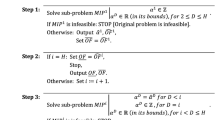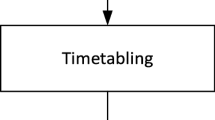Abstract
Revenue Management (Abbr. RM) method was introduced after the deregulation of the U.S. airline industry in 1970s. The application experience shows that RM is a valuable management method for transportation efficiency enhancement. However, there are few literatures reported to exploit RM advantages in passenger high-speed railway. After a brief review of research development of RM in railway, we propose a dynamic optimization model for a single line high speed passenger railway with multiple fares and time periods. Some practical factors such as two way travelling direction, coupling and decoupling of train units, flexible stopping pattern are combined into our model. It is an integrated model that optimizes seat inventory allocation and train departure schedule in order to maximize the overall revenue. With a set of real operational data of a high speed railway, numerical results show that this approach can be applied in practice and may significantly improve the operation performance.
Access this chapter
Tax calculation will be finalised at checkout
Purchases are for personal use only
Preview
Unable to display preview. Download preview PDF.
Similar content being viewed by others
References
Abe, I.: Revenue Management in the railway industry in Japan and Portugal: a stakeholder approach. Technology and Policy Program. MIT, MA (2007)
Ben-Khedher, N., et al.: Schedule optimization at SNCF: from conception to day of departure. Interfaces 28, 6–23 (1998)
Ciancimino, A., et al.: A mathematical programming approach for the solution of railway yield management problem. Transportation Science 33, 168–181 (1999)
Hood, S.A.: MERLIN: model to evaluate revenue and loadings for intercity. In: Proceedings of the Second Annual International Conference on Yield Management, Held in Conjunction with the Operational Research Society 39th Annual Conference, University of Bath, pp. 147–158 (2000)
Manugistics, Inc., GNER: Implementing the UK’s first-ever rail optimization solution, http://www.manugistics.com/documents/collateral/GNER.pdf
Sibdari, S., Lin, K., Chellappan, S.: Multiproduct revenue management: an empirical study of auto train at Amtrak. Journal of Revenue and Pricing Management 7(2), 172–184 (2008)
Tian, Y., et al.: Application of revenue management in European and American railways. China Railway 6, 63–66 (2008)
Author information
Authors and Affiliations
Editor information
Editors and Affiliations
Rights and permissions
Copyright information
© 2012 Springer-Verlag GmbH Berlin Heidelberg
About this paper
Cite this paper
Wang, Y., Lan, B.X., Zhang, L. (2012). A Revenue Management Model for High-Speed Railway. In: Ni, YQ., Ye, XW. (eds) Proceedings of the 1st International Workshop on High-Speed and Intercity Railways. Lecture Notes in Electrical Engineering, vol 147. Springer, Berlin, Heidelberg. https://doi.org/10.1007/978-3-642-27960-7_9
Download citation
DOI: https://doi.org/10.1007/978-3-642-27960-7_9
Publisher Name: Springer, Berlin, Heidelberg
Print ISBN: 978-3-642-27959-1
Online ISBN: 978-3-642-27960-7
eBook Packages: EngineeringEngineering (R0)




